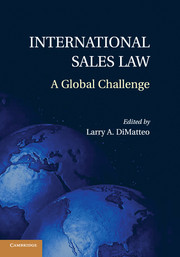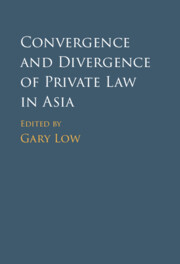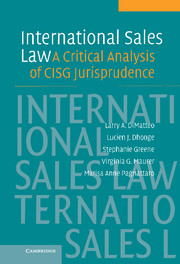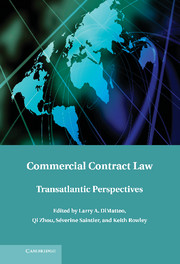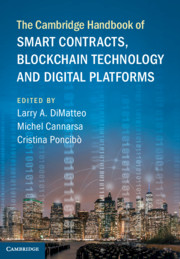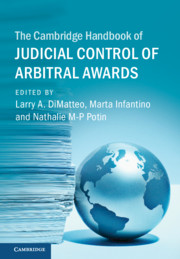International Sales Law
Part I. History and Researching the CISG: 1. Global challenge of international sales law Larry A. DiMatteo; 2. History of the CISG and its present status Vikki Rogers and Kaon Lai; 3. CISG: divergences between success-scarcity and theory-practice Olaf Meyer; 4. CISG sources and researching the CISG Marie Stefanini Newman; 5. CISG translation issues: reducing legal babelism Claire M. Germain; 6. CISG in national courts Camilla Andersen; Part II. Interpretation and Use of CISG: 7. Interpretive methodologies in the interpretation of the CISG Larry A. DiMatteo and AndraɠJanssen; 8. Divergent interpretations – reasons and solutions Ingeborg Schwenzer; 9. Good faith principle – vexata quaestio Francesco G. Mazzotta; 10. CISG and international arbitration André Janssen and Matthias Spilker; 11. The CISG as soft law and choice of law Lisa Spagnolo; Part III. Interpreting CISG’s Substantive Provisions: 12. Contract formation Morton Midtgaard Fogt; 13. CISG and the battle of the formThis book brings together the top international sales law scholars from twenty-three countries to review the Convention on Contracts for International Sale of Goods (CISG) and its role in the unification of global sales law at present and into the future. The book covers three general research methodologies: (1) Doctrinal or Descriptive, (2) Theoretical, and (3) Practical. In the area of Doctrinal-Descriptive analysis, the substance of CISG rules is reviewed and alternative interpretations of those rules are analyzed. A comparative analysis is given of how numerous countries have accepted, interpreted, and applied the CISG. Theoretical insights are offered into the problems of uniform laws, the CISG’s role in bridging the gap between the common and civil legal traditions, and the debate over the proper role of good faith in CISG jurisprudence. The practitioner perspective argues that the CISG should be viewed as an opportunity to further the interests of business clients. The book includes a review of the case law relating to the interpretation and application of the provisions of the CISG; analyzes how the CISG has been recognized and implemented by national courts, as well as arbitral tribunals; offers insights into the problems of uniformity of application of an international sales convention; compares the CISG with the English Sale of Goods Act and places the CISG in the context of other texts of UNCITRAL; and analyzes the CISG from the practitioner’s perspective, including how to use the CISG proactively. s Bruno Zeller; 14. Conformity of goods – inspection and notice Harry M. Flechtner; 15. Interpreting fundamental breach Aneta Spaic; Part IV. Remedies and Damages: 16. Remedies – damages, price reduction, avoidance, mitigation, and preservation Ulrich Magnus; 17. Legal costs as reimbursable damages Burghard Piltz; 18. Excuse of impediment and its usefulness Martin Davies; Part V. Country Analyses: Europe: 19. Austria Wolfgang Faber; 20. Baltic states, Belarus, and Ukraine Tadas Klimas; 21. France Sylvaine Poillot-Peruzzetto; 22. Germany country analysis – good faith, formation, and conformity of goods Stefan Kröll; 23. Germany country analysis – remedies Sörren Kiene; 24. Italy Edoardo Ferrante; 25. The Nordic countries Jan Ramberg; 26. CISG in Southeastern Europe Milena Djordjević and Vladimir Pavić; 27. Spain Pilar Perales Viscasillas and Javier Solana Álvarez; 28. Switzerland Corinne Widmer Lüchinger; 29. The Netherlands Sonja A. Kruisinga; Part VI. A World View of the CISG: 30. Islamic legal systems and the CISG: the case of Egypt Hossam A. El-Saghir; 31. Israel Yehuda Adar; 32. New Zealand Petra Butler; 33. Peoples’ Republic of China Li Wei; 34. United States and Canada Robert W. Emerson and Ann M. Olazábal; 35. Central and South America Virginia G. Maurer; 36. CISG across national legal systems Larry A. DiMatteo; Part VII. Theoretical Insights:
- Uses different research methodologies and perspectives: doctrinal, theoretical and empirical analyses
- Contains numerous country and regional analyses of the application of the CISG in national courts and arbitral tribunals
- Includes original research provided by scholars from 23 countries
Product details
January 2016Paperback
9781107585003
804 pages
252 × 176 × 44 mm
1.5kg
6 b/w illus. 5 maps 3 tables
Available
Table of Contents
- Part I. History and Researching the CISG:
- 1. Global challenge of international sales law Larry A. DiMatteo
- 2. History of the CISG and its present status Vikki Rogers and Kaon Lai
- 3. CISG: divergences between success-scarcity and theory-practice Olaf Meyer
- 4. CISG sources and researching the CISG Marie Stefanini Newman
- 5. CISG translation issues: reducing legal babelism Claire M. Germain
- 6. CISG in national courts Camilla Andersen
- Part II. Interpretation and Use of CISG:
- 7. Interpretive methodologies in the interpretation of the CISG Larry A. DiMatteo and André Janssen
- 8. Divergent interpretations - reasons and solutions Ingeborg Schwenzer
- 9. Good faith principle - vexata quaestio Francesco G. Mazzotta
- 10. CISG and international arbitration André Janssen and Matthias Spilker
- 11. The CISG as soft law and choice of law Lisa Spagnolo
- Part III. Interpreting CISG's Substantive Provisions:
- 12. Contract formation Morton Midtgaard Fogt
- 13. CISG and the battle of the forms Bruno Zeller
- 14. Conformity of goods - inspection and notice Harry M. Flechtner
- 15. Interpreting fundamental breach Aneta Spaic
- Part IV. Remedies and Damages:
- 16. Remedies - damages, price reduction, avoidance, mitigation, and preservation Ulrich Magnus
- 17. Legal costs as reimbursable damages Burghard Piltz
- 18. Excuse of impediment and its usefulness Martin Davies
- Part V. Country Analyses: Europe:
- 19. Austria Wolfgang Faber
- 20. Baltic states, Belarus, and Ukraine Tadas Klimas
- 21. France Sylvaine Poillot-Peruzzetto
- 22. Germany country analysis - good faith, formation, and conformity of goods Stefan Kröll
- 23. Germany country analysis - remedies Sörren Kiene
- 24. Italy Edoardo Ferrante
- 25. The Nordic countries Jan Ramberg
- 26. CISG in Southeastern Europe Milena Djordjević and Vladimir Pavić
- 27. Spain Pilar Perales Viscasillas and Javier Solana Álvarez
- 28. Switzerland Corinne Widmer Lüchinger
- 29. The Netherlands Sonja A. Kruisinga
- Part VI. A World View of the CISG:
- 30. Islamic legal systems and the CISG: the case of Egypt Hossam A. El-Saghir
- 31. Israel Yehuda Adar
- 32. New Zealand Petra Butler
- 33. Peoples' Republic of China Li Wei
- 34. United States and Canada Robert W. Emerson and Ann M. Olazábal
- 35. Central and South America Virginia G. Maurer
- 36. CISG across national legal systems Larry A. DiMatteo
- Part VII. Theoretical Insights:
- 37. Problems of uniform laws Jan M. Smits
- 38. CISG as bridge between common and civil law Sieg Eiselen
- 39. Pre-contractual liability and preliminary agreements Marco Torsello
- Part VIII. Practitioner's Perspective:
- 40. Empirical evidence of courts and counsels' approach to the CISG (with some remarks on professional liability) Ulrich Schroeter
- 41. CISG and English sales law: an unfair competition Qi Zhou
- 42. CISG in context of complementary texts Luca Castellani
- 43. Soft laws as models for the improvement of the CISG Ole Lando
- 44. Using the CISG proactively Helena Haapio
- 45. Future challenge of international sales law Larry A. DiMatteo.

